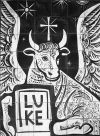
The Gospel of Luke
The Leaven of the Pharisees: Lk 12,1-12
Luke makes a notable point about the crowd increasing in size from 11,29. Yet what follows will be addressed to the disciples as we saw in the overview. Jesus speaks to the crowds again in verse 54, the second part of his speech. Mostly though the crowd are just present as Jesus speaks with his disciples.
The key word in verse 1 is "hypocrisy"; it governs all twelve verses. Unlike Mark and Matthew, Luke says clearly that the leaven of the Pharisees is hypocrisy, living in a way which does not conform to their teaching. It is Matthew who is especially fond of the word "hypocrisy" (chapter 23). Luke however uses the word only here (of the Pharisees) and then of the crowd in 12,56 and 13,15. The three occurances therefore come in this speech of Jesus, 12,1-13,21.
However the charge is first a warning to the disciples in verses 2 & 3: "what you have said and what you have whispered" in verse 3.
Verse 4 is the only time in the Synoptic Gospels that Jesus calls his disciples "My friends", though Jesus says his disciples are friends in John 15,15.
"Fear" in verses 4 and 5 has its basic meaning of being frightened. Yet the fear in verse 5 is the learnt fear which is a respect in God, an acknowledgement of just who he is: the fear of the Lord is the beginning of wisdom (Proverbs 1,7)
Thus the negative message of verse 4 and 5 becomes positive in verses 6 and 7: God does not forget and does cares for them.
The sparrows in verse 7 become ravens a little later in the chapter, 12,24.
The comparison with Matthew 10,32-33, indicates that Luke has Jesus calling himself "Son of Man" and he speaks of the angels of God instead of the Father.
Verses 10 to 12 need to be taken together. Then the teaching of the Holy Spirit in verse 12 shows how the blasphemy against the Holy Spirit in verse 10 is a stubborn refusal to accept his teachings, from Jesus, the disciples or the Church.
We can return to the main page.
